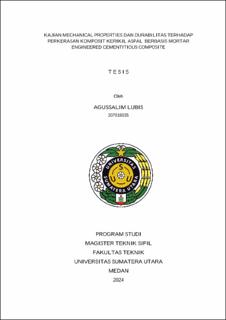Kajian Mechanical Properties dan Durabilitas Terhadap Perkerasan Komposit Kerikil Aspal Berbasis Mortar Engineered Cementitious Composite
Mechanical Properties and Durability Study of Engineered Cementitious Composite Mortar-Based Asphalt Gravel Composite Pavement

Date
2024Author
Lubis, Agussalim
Advisor(s)
Aswin, Muhammad
Hasibuan, Gina Cynthia Raphita
Metadata
Show full item recordAbstract
Increasing population growth is accompanied by an increase in traffic volume. These conditions must be supported by quality road construction to provide safety and comfort. Asphalt and cement are the main materials used for road construction, these materials were chosen because they produce good road construction as flexible pavement and rigid pavement. Flexible pavement in Indonesia has shortcomings that cause damage. Damage to flexible pavement is caused by not being able to withstand hot weather, not being able to withstand being submerged in water, or being able to withstand use (overloading). Meanwhile, rigid pavement whose main material is cement also has disadvantages, namely that road users feel less comfortable driving because the deflection is relatively small and vehicle tires wear out easily, are prone to breaking and slipping, especially when it rains. Palm shell ash is factory waste which cannot be utilized optimally if left untreated, which poses a risk of environmental pollution. For this reason, research is being carried out on composite road pavements using asphalt, cement, gravel and palm shell ash so that composite road construction becomes semi-flexible or semi-rigid which can reduce waste and be a solution to the impact of environmental pollution and is comfortable for driving. The results of this research only discuss mechanical properties, namely compressive strength, flexural strength and durability (impact strength and fire resistance). On the basis of this research, the gravel-asphalt mixture is mixed in ECC mortar to fill the voids and pores in the mixture. ECC mortar is a gravel-asphalt grouting material composed of cement, sand, superplasticizer water and palm shell ash without gravel. The proportion of palm shell ash used in the ECC mortar mixture is 5%, 10%, 15% and without palm shell ash (0%), where the use of ECC mortar as gravel-asphalt grouting will be the ECC mortar which has the highest compressive strength value from the use of variations palm shell ash. The benefit of this research is as a reference for making composite road pavement by providing information on the influence of compressive strength, flexural strength, impact strength and fire resistance. The optimum compressive strength test results aged 3 days on ECC mortar were 42.67 MPa with a palm shell ash proportion of 10%. Furthermore, the results of the 28 day age test on the ECC mortar based gravel-asphalt composite pavement showed that the average compressive strength was 9.04 MPa, the average flexural strength was 1.86 MPa. The impact test was 10 times without breaking or destroying, only experiencing light cracks. In the fire resistance test for ±16 minutes until the temperature reached ±560°C, the test object did not experience cracks, holes or destruction but only the asphalt content melted at the edge of the surface
Collections
- Master Theses [278]
